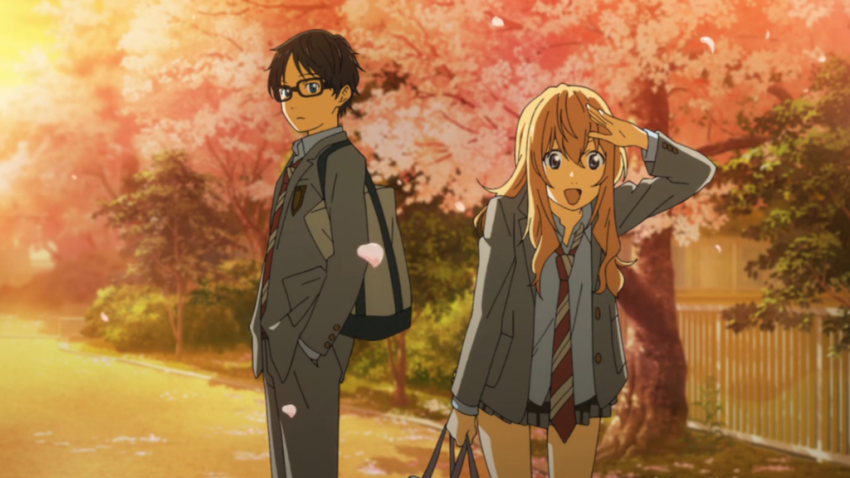Your Lie in April part 2
May 6, 2017 · 0 comments
By Andrew Osmond.
 With fortuitous timing, the concluding half of Your Lie in April comes soon after A Silent Voice brought a wider audience to a side of anime once neglected; the emotional, even tragic, real-world teen drama. Once again, it’s about a boy and a girl with deep problems; about how they awaken huge potential in one another; and about the fight between light and dark in their everyday lives.
With fortuitous timing, the concluding half of Your Lie in April comes soon after A Silent Voice brought a wider audience to a side of anime once neglected; the emotional, even tragic, real-world teen drama. Once again, it’s about a boy and a girl with deep problems; about how they awaken huge potential in one another; and about the fight between light and dark in their everyday lives.
If you’ve not seen the first volume, Your Lie in April is about a boy, Kousei, who’s a piano prodigy tortured by the loss of his mother. It’s also about Kaori, the relentlessly buoyant girl violinist determined to break Kousei out of his shell by any means. While the series had a far lighter-seeming opening than A Silent Voice, with many goofy gags, it soon got heavy. We plunged into the depths of Kousei’s psyche – almost literally, as he imagines playing the piano as being trapped on an ocean floor. At the same time, the lad is progressing. Kaori, for instance, notes that Kousei doesn’t look down at the ground any more.
But it’s in its second half that the series gets really heavy. You can’t say you weren’t warned. There were plenty of clues to where the show was going, most obviously with Kaori’s spell in hospital early in the series. Early in volume 2… something bad happens. It has Kousei struggling to cope with his worst crisis since he lost his mother. It also hits other people in his life, especially his childhood friend Tsubaki, who’s already struggling with the realisation that she sees Kousei as more than the shrimp kid from kindergarten. It’s a painful, emotionally blocked situation – comparable, again, to some developments in Silent Voice.
 Your Lie in April is markedly different from Voice, of course, not least because it can accommodate much more story in its 22 episodes than Voice could in a feature. Like Voice, Lie is based on a lengthy manga, serialised in a boys’ magazine, despite emotional content that might stereotypically suggest girls’ fare. Both Voice and Lie ran in magazines published by Kodansha. Voice ran in the company’s Weekly Shonen Magazine (more on it here), while Lie ran in Monthly Shonen Magazine. The strips overlapped in the 2010s, though Lie ran longer (2011 to 2015), because of its monthly release and because it filled eleven volumes to Voice’s seven.
Your Lie in April is markedly different from Voice, of course, not least because it can accommodate much more story in its 22 episodes than Voice could in a feature. Like Voice, Lie is based on a lengthy manga, serialised in a boys’ magazine, despite emotional content that might stereotypically suggest girls’ fare. Both Voice and Lie ran in magazines published by Kodansha. Voice ran in the company’s Weekly Shonen Magazine (more on it here), while Lie ran in Monthly Shonen Magazine. The strips overlapped in the 2010s, though Lie ran longer (2011 to 2015), because of its monthly release and because it filled eleven volumes to Voice’s seven.
Lie was written by a male artist, Naoshi Arakawa, who describes conceiving his manga in brutally mercenary terms. “When I first became a mangaka, I worked with a storywriter to make a slice-of-life manga about teenagers,” he told Kodansha. “My next manga was about soccer, but it was also in a slice-of-life style. When I got a chance to make my own series, the editors told me to do the same thing, but I’d already started to get bored with that, since I’d drawn so many of those in a row. So I started to think, “What if I did a shonen (boys’) manga with some romance, like in a shojo (girls’) manga?” Eventually, though, I even got bored of that, so I decided to make the musical performance scenes more like in a shonen manga, so I could blow off some steam.”
Indeed, the performances punctuate Lie like battles in a fight anime, or else the time-distorting matches in sports shows from Star of the Giants to Ping Pong The Animation. In Your Lie in April, the piano keyboard is an inescapable black hole for Kousei, but then a realm of blinding, cathartic realisations, a place to find identities and save souls – and not just Kousei’s.
There had been music sagas in manga before. When Lie began serialisation, Monthly Shonen Jump had recently finished Beck, Takahiro Sakuishi’s opus about a rock band, which was why Arakawa based Lie around classical music. Another difference: Beck is centred around boys. Lie, though, places a boy between two girls in a quasi-love triangle (though it’s more complicated than that, and Kousei’s too dense to realise anyway).
The tensions are a large part of Lie’s addictiveness, although Arakawa revealed that for him, the ending was locked early – by the anime. “When volume three of Lie was published in Japan, we received an offer for the anime adaptation,” he told Anime News Network. “At that point, I told the anime producer about the ending I had in mind, and the anime producer really liked that ending. That’s why I felt that after that happened, I really couldn’t change my mind about the ending because that would affect the animation production. At one point or another, almost everyone involved with this series felt like ‘Maybe we should change the ending…’ But at the end, we decided to stick with my initial idea.”
 It’s interesting that Arakawa felt this way, given other anime have had radically different endings from their source manga, sometimes with the manga author’s encouragement – see our article on Fullmetal Alchemist. Perhaps Lie would have ended differently had the anime been adapted after the manga finished (like A Silent Voice, which one could also imagine ending differently). In the event, the anime’s broadcast overlapped with the last manga chapters, from October 2014 to March 2015. It was broadcast on Fuji TV’s high-profile Noitamina block, which had already screened Nodame Cantabile and Kids on the Slope. It had also showed Anohana, another emotionally high-strung teen drama by Your Lie’s studio, A-1 Pictures. (A-1’s related film Anthem of the Heart has tonal similarities to Your Lie too.)
It’s interesting that Arakawa felt this way, given other anime have had radically different endings from their source manga, sometimes with the manga author’s encouragement – see our article on Fullmetal Alchemist. Perhaps Lie would have ended differently had the anime been adapted after the manga finished (like A Silent Voice, which one could also imagine ending differently). In the event, the anime’s broadcast overlapped with the last manga chapters, from October 2014 to March 2015. It was broadcast on Fuji TV’s high-profile Noitamina block, which had already screened Nodame Cantabile and Kids on the Slope. It had also showed Anohana, another emotionally high-strung teen drama by Your Lie’s studio, A-1 Pictures. (A-1’s related film Anthem of the Heart has tonal similarities to Your Lie too.)
Last September saw a live-action film of Your Lie in April (trailer). In it, Kaori is played by Suzu Hirose, who’s made her name in both live-action (Hirokazu Kore-eda’s Our Little Sister) and anime (Mamoru Hosoda’s The Boy and the Beast). But it was the anime version which wowed Your Lie’s author. “We can’t simply compare manga and anime because they’re different media,” Arakawa told Anime News Network. “However, when I saw the anime, I thought, ‘Wow, they really tried very hard to make (it) look and sound terrific.’ I saw the storyboards for a two-minute scene, and it was like this huge stack of story boards. That made all the staff cry.”
Andrew Osmond is the author of 100 Animated Feature Films. Your Lie in April, part two, is released in the UK by Anime Limited.
Leave a Reply